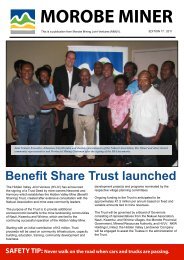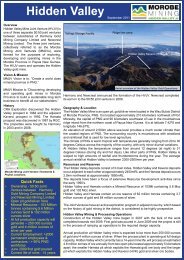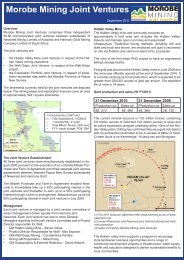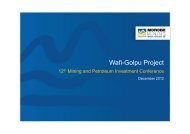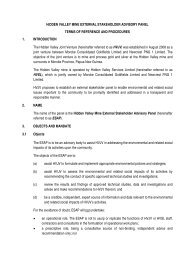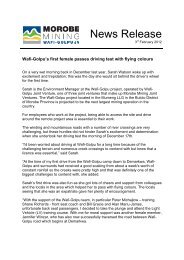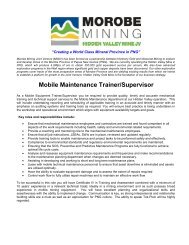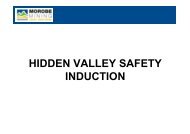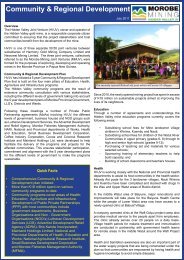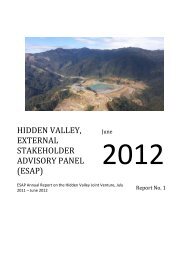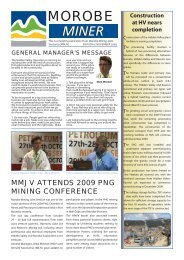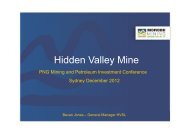Community & Regional Development Fact Sheet - Morobe Mining ...
Community & Regional Development Fact Sheet - Morobe Mining ...
Community & Regional Development Fact Sheet - Morobe Mining ...
Create successful ePaper yourself
Turn your PDF publications into a flip-book with our unique Google optimized e-Paper software.
COMMUNITY &<br />
REGIONAL DEVELOPMENT<br />
<strong>Community</strong> & <strong>Regional</strong> <strong>Development</strong> Plan<br />
Hidden Valley Joint Venture initiated a five year <strong>Community</strong> &<br />
<strong>Regional</strong> <strong>Development</strong> Plan in 2010 focused on the four main<br />
pillars of Education, Health, Agriculture and Infrastructure<br />
programmes.<br />
The comprehensive plan is addressing long term social and<br />
community development needs amongst the communities. To<br />
date K20 million has been invested in agriculture, aquaculture,<br />
health, education, community infrastructure, water supply and<br />
sanitation, community and LLG capacity building programs, and<br />
the Lae to Bulolo Highway maintenance.<br />
Partner in <strong>Development</strong><br />
Projects and programs are the result of extensive community<br />
consultation with the different levels of government taking into<br />
account the five year development plans of <strong>Morobe</strong> Provincial<br />
Government, LLG’s, Districts and Wards. Private Public<br />
Partnership agreements are also in place to continue delivery of<br />
programs and projects. Some of these partnerships involve<br />
organisations such as Lutheran <strong>Development</strong> Services, Adventist<br />
<strong>Development</strong> and Relief Agency, <strong>Morobe</strong> Fisheries Management<br />
Authority, National Agriculture Research Institute, National and<br />
Provincial departments of Works, Health and Education, Small<br />
Business <strong>Development</strong> Corporation, Coffee Industry Corporation,<br />
and Cocoa & Coconut Research Institute.<br />
Education<br />
Close consultation with the government’s education departments<br />
has seen a number of programs being successfully implemented:<br />
- First elementary schools established in Nauti and Winima<br />
landowner villages<br />
- Nine double classrooms built in Huon Gulf to Bulolo districts<br />
- A school fee subsidy program that has benefited over 1500<br />
students attending over 50 schools at a cost of K580,000<br />
- Purchasing of teaching aid and materials for selected schools<br />
- Sponsoring training of elementary teachers to help build capacity<br />
- Education baseline survey for impact areas conducted<br />
Planning for education infrastructure in both Hidden Valley and<br />
Wafi-Golpu impacted communities is continuing.<br />
Hidden Valley mine has so far sent four batches of selected<br />
landowners and community representatives to the Wau small<br />
scale school of alluvial mining. This practical programme was<br />
initiated by the Mineral Resources Authority and the European<br />
Union with the sponsorship commitment of Hidden Valley, to<br />
improve techniques and yields for small scale miners.<br />
Health<br />
HVJV is working closely with the National and Provincial health<br />
departments to assist its host communities in the health sector.<br />
- Aid posts built and stocked with drugs for the three landowner<br />
villages of Nauti, Winima and Kwembu situated in the Wau and<br />
Upper Watut areas of Bulolo District.<br />
- More than 10 villages in the Lower Watut are accessing a newly<br />
opened clinic at Babuaf Village.<br />
- A company operated clinic at the Wafi-Golpu project camp also<br />
provides medical service to communities apart from employees.<br />
- Joint community health patrols and education conducted on<br />
Maternal Child Health, TB, HIV and malaria in partnership with<br />
government health teams for remote areas.<br />
- Capacity building for health workers<br />
- Health and Sanitation awareness to empower communities have<br />
health and hygiene knowledge to avoid simple diseases<br />
- Engagement of Angau Hospital, UPNG and Unitech for utilisation<br />
of Rural Medical Officers and nursing students<br />
- A MMJV Health Baseline Survey being conducted in late 2012<br />
In 2012 a Five Year Partnership Agreement reached with the Oil<br />
Search Health Foundation commenced in the Wafi area but will<br />
expand to other health objectives throughout Bulolo and Huon<br />
Gulf Districts. This project, among other initiatives, aims to<br />
combat malaria by improving access to early malaria diagnosis<br />
and appropriate treatment and decreasing malaria-related<br />
morbidity.<br />
In an area where alluvial mining follows the rich history of gold<br />
production from the sands of the rivers of Wau and Bulolo,<br />
CRD <strong>Fact</strong>sheet November 2012
CRD <strong>Fact</strong>sheet November 2012<br />
Roads & Foot Bridges<br />
MMJV works in partnership with Department of Works and the<br />
National Road Authority engineers to monitor, scope and repair<br />
badly deteriorated sections of the Lae-Bulolo Highway.<br />
Under the infrastructure program, MMJV has carried out in<br />
cooperation with partners on local and national infrastructure.<br />
Local infrastructure upgrades to landowner village roads to Nauti<br />
and Winima as well as the alternative Wandumi road linking<br />
Bulolo and Wau.<br />
An MOU was signed in 2012 between MMJV and DOW Local<br />
Government Engineering Division to pave way for site survey and<br />
investigation and construction of the Samsam, Sambio and Taiak<br />
footbridge sites. Through MMJV, a draft agreement was also<br />
reached with Bulolo District JDPBPC to co-fund up to K450,000 for<br />
9 footbridges along Watut River.<br />
Water Supplies<br />
For many communities who face long daily walks to access fresh<br />
water supplies, more than K2 million has been spent on providing<br />
clean, reliable village water installations. The water supply<br />
programme is accompanied by sessions of health and sanitation<br />
awareness. So far, projects have been implemented in landowner<br />
villages of Nauti, Kwembu and Winima, and more than 40 villages<br />
in the Lower Watut, Middle Watut, Upper Watut and the Wafi<br />
region.<br />
Lower Watut has seen 14 completed projects in villages including<br />
Goraris, Chiatz, Mafanazo, Uruf, Wonkinz, Kapungung, Wampan,<br />
Tsilitsili, Malarina, Kasek, Magaring, Pekumbe and Wawas. 13<br />
projects completed and in various stages of completion in Middle<br />
Watut including Widipos, Baiyune, Samsam/Pelengkua, Sambio,<br />
Galawo, Taiak, Gawapu, Biamena, Piu, Dambi, Kapin, Nayakes. For<br />
Upper Watut, 18 water projects have been installed and in various<br />
stages of completion including Winima, Kwembu 1, 2 & 3, Golden<br />
Pine, Manki 1and 2, Nauti, Latep, Tapanda, Erowa Creek, Saksak,<br />
Mango Block, Neranda, Aibinka, Minianda, Society and Heyu.<br />
Provision of water projects in these areas are improving life and<br />
community health throughout the Watut River region.<br />
Agriculture/Aquaculture Programs<br />
Along with clean water goes improved nutrition, and also<br />
addressed are agriculture and fish farming. Training is aimed at<br />
complementing the skills of the village people who depend on<br />
their land.<br />
There is focus on cocoa, coffee, fresh produce and aquaculture to<br />
improve production, improve marketing and management,<br />
improve downstream processing and manufacturing, and<br />
strengthen extension research and development. Nearly K1<br />
million has been spent on various agriculture and aquaculture<br />
projects and capacity building programs.<br />
Five cocoa fermentries have been constructed in Lower Watut<br />
and a partnership has been formed with Business for Millenium<br />
<strong>Development</strong> to explore and develop the Watut Chocolate<br />
Project.<br />
Fish farmer trainings in Lower Watut and Middle Watut have seen<br />
four model fish pond construction and stocking at villages<br />
including Mafanazo, Magaring, Malasap, and Kisi-Ono. Fish are<br />
thriving in the ponds, and adding a new source of nutrition and<br />
family income.<br />
For more information, please contact MMJV Media & Communications<br />
on +675 472 1703 or email us at mmj.media@morobejv.com<br />
www.morobejv.com



